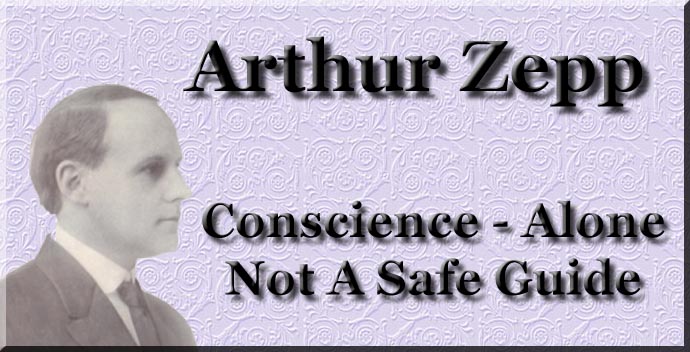
Conscience - Alone Not A Safe Guide
By Arthur Zepp
Chapter 5
CONSCIENCE UNPERVERTED AN INESTIMABLE BLESSING
In this unperverted
state conscience (where the Bible is unknown) is an invaluable blessing as it
would lead to salvation if its dictates were followed. Only when conscience is
gladly followed in its incitements to right it may be said to answer the
definition often given "the voice of God in the soul." IT IS
MANIFESTLY NOT THE "VOICE OF GOD" IN THE SOUL WHEN IT ALLOWS THOSE
THINGS IN HEART OR LIFE WHICH GOD'S WORD PLAINLY CONDEMNS. Conscience is the
voice of God to the heathen, without the revealed ward of God, as is also God's
revelation in nature, another voice, and, if the heathen follows the light of
these, salvation will ensue. But we of the Dr. Finney has a sermon on Conscience, in which
he proves conscience (unperverted) and the Bible
harmonize and agree‑that is what the Bible requires of men, Conscience
affirms to be correct. For example: The Bible commands love to God and
man; and Conscience affirms the same obligation. Though some deny the Bible to
be the revealed word of God still they admit independent of its revelation
there is a Supreme Intelligence and we are obligated to love Him as well as our
fellows. By this admission they but show the natural agreement of conscience
with revelation. The Bible reveals the depravity of the human heart, in its unrenewed state; Conscience assents to this; men are
depraved. The Bible affirms guilt, presses the sinner with
a sense of blame; so does Conscience. The Bible demands repentance. Conscience alarms
man; if he does not repent there is no hope. The Bible demands faith and entire
holiness. Conscience responds that we cannot enjoy God here or hereafter
without being like Him, and that faith, only, brings holiness. The Bible
teaches man's position as a sinner to be wrong. Conscience approves this
affirmation. The Bible reveals an atonement for sin as
necessary to salvation, and the sinner, under God's displeasure, and that
Jesus' sacrifice is sufficient. Conscience affirms this same necessity and the
sufficiency of Jesus' sacrifice. Through all ages men have been (through
conscience) devising some form of sacrifice to render it proper for God to
forgive the sinner. The Bible and conscience agree in affirming the doctrine of
"endless punishment." Conscience could teach nothing else. It could
at no time in eternity say, "I have suffered enough to satisfy the
(offended) laws of God. I deserve no more. Wonderful harmony: Surely this is
the strongest argument for he inspiration of God's
word." The foregoing is a remarkable confirmation of
the inspiration of God's word. Here is a book we call the Bible‑God's own
word. In it He speaks His mind, and here is set up somewhere in man a something
or faculty we call conscience‑voice of God‑spark of the Divine
remaining in the soul of man, and it agrees fully with the word. Of course the foregoing is only true of a live
conscience which is not yet seared and calloused by persistent rejection or sin
against light. A dead conscience is dead to reason, God's word and spirit alike.
Let it not be supposed because conscience, when unperverted
by repeated sin, agrees with God's word, that men do what they agree to be
right. Far from it. Countless thousands admit the
rightness of God's requirements and still go on doing their own will and
following their own ways. They say "Lord, Lord," and "Yea,
Lord," and do not the things which He says. |
|
 |
 |
|
|
|
-
Site Navigation
 Home
Home What's New
What's New Bible
Bible Photos
Photos Hiking
Hiking E-Books
E-Books Genealogy
Genealogy Profile
Free Plug-ins You May Need
Profile
Free Plug-ins You May Need
 Get Java
Get Java.png) Get Flash
Get Flash Get 7-Zip
Get 7-Zip Get Acrobat Reader
Get Acrobat Reader Get TheWORD
Get TheWORD